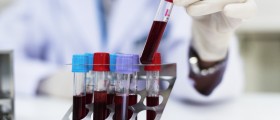Creatinine is a chemical compound that is normally excreted in the urine. It is a product of muscle metabolism in the body. This substance does not stay in the body and it is eliminated by kidneys. This is why improper excretion of creatinine instantly points to the presence of certain kidney disorder which features with inability to excrete many other waste substances from the body.
Elevation of urine creatinine levels in the body and the reduction of creatinine in the urine is a sign of serious damage to the kidneys. Because creatinine levels do not depend on any other process in the body, such as increased physical activity, infections, etc. this substance is highly reliable and routinely used in assessment of the kidney function.

Normal Levels of Creatinine in Urine
There is a slight difference in creatinine levels between the two genders, and its levels also depend on the age of the patient. Men have a bit elevated creatinine levels compared to women. This can be easily explained by the fact that men feature more muscle mass than women. As for the difference regarding age, the rate of muscle metabolism reduces with age, and this is why elderly people normally have lower urine creatinine levels compared to younger people.
A 24-hour urine sample normally contains between 500 and 2000 mg of creatinine. Some variations are related to gender and the age of the patient, and they are taken into consideration every time during the interpretation of the results.
In women, the blood creatinine levels are between 0.5 and 1.0 mg/dL, and in men between 0.6 and 1.2 mg/dL. In children, this number ranges from 0.3 to 0.7 mg/dL, while in teenagers it goes from 0.5 to 1.0 mg/dL. And finally, in people who have only one functional kidney, the normal blood level of creatinine is around 1.8 or 1.9 mg/dL.
Abnormal Levels of Creatinine
Any abnormality of creatinine levels, especially its elevation, points to the presence of some kidney disorder. This is why if an elevation of creatinine in blood or urine is accidentally found, it requires further tests and examinations to determine the underlying cause. In people who are already suffering from kidney disorders, elevation of creatinine levels in the blood points to the progression of the current disease or recurrence of the previously cured illness.
- We included 1072 men and 537 women with non-dialysis CKD stages 1 to 5, all of them with repeated measurements of glomerular filtration rate (mGFR) by 51Cr-EDTA renal clearance and several nutritional markers. In those with stage 1 to 4 at baseline, we used a mixed model to study factors associated with urinary creatinine excretion rate and its change over time.
- Baseline mean urinary creatinine excretion decreased from 15.3±3.1 to 12.1±3.3 mmol/24 h (0.20±0.03 to 0.15±0.04 mmol/kg/24 h) in men, with mGFR falling from ?60 to
- Mean annual decline in mGFR was 1.53±0.12 mL/min/1.73 m2 per year and that of urinary creatinine excretion rate, 0.28±0.02 mmol/24 h per year. Patients with fast annual decline in mGFR of 5 mL/min/1.73 m2 had a decrease in urinary creatinine excretion more than twice as big as in those with stable mGFR, independent of changes in urinary urea as well as of other determinants of low muscle mass.
Low creatinine levels in urine point to the presence of glomerulonephritis, kidney failure, urinary tract obstruction, kidney infection, and many other kidney disorders which affect the proper excretion of creatinine.
Creatinine in urine is increased in many conditions, and there is increased degradation of muscle tissues. They include muscular dystrophy, rhabdomyolysis, strenuous exercise, muscle injury, crushing injuries, and burns. Elevation of creatinine in the urine may also occur in acromegaly, gigantism, dehydration, and pregnancy. And finally, increased creatinine levels in urine may also be a consequence of a high meat intake diet.

















Your thoughts on this
Loading...